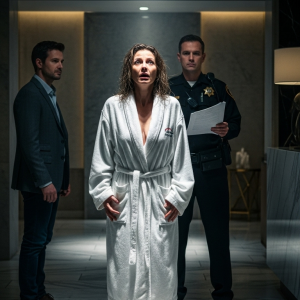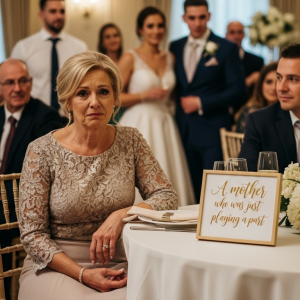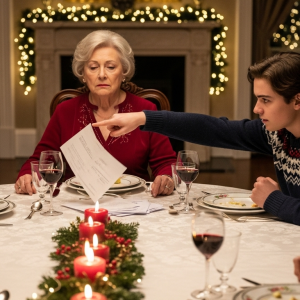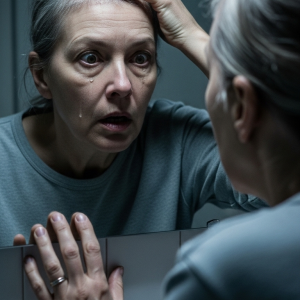I should have known something was wrong when Meadow insisted on coming grocery shopping. My daughter-in-law rarely did anything that didn’t benefit her directly, yet there she was, perfectly made up at 10 AM, her blonde hair in an elegant bun. “Come on, Grandma Bessie,” my grandson Jud called from the backseat. “We’re going to get ice cream!” At 70 years old, I still felt a flutter of joy when he included me, as it happened so rarely these days.
I climbed into the back, my arthritis protesting every slow movement. Meadow glanced back with barely concealed irritation. “Try not to embarrass us in there,” she muttered, her voice just loud enough for me to hear but quiet enough to escape my son, Blaine, from the driver’s seat. I said nothing. I’d learned over the years that responding to her little digs only made things worse.
The grocery store, Morrison’s Market, was busy. I’d been shopping here for over 30 years. The familiar aisles and friendly faces usually brought me comfort. We made our way to the checkout, with Meadow directing our path like a military commander. A young cashier, probably in his early 20s, looked up and smiled warmly. “Good morning, ma’am. How are you doing today?”
Before I could respond, Meadow stepped between us, her voice sharp and cutting. “This old woman is the maid. Don’t talk to her.” The words were a physical blow. My breath caught, and heat rushed to my cheeks. The cashier’s face fell, confusion replacing his friendly demeanor.
But worse than Meadow’s words was what happened next. Blaine, my own son, the boy I’d raised and sacrificed for, burst into laughter. It was full, hearty laughter, as if what Meadow had said was the funniest thing he’d heard all week. Jud joined in, his 12-year-old voice adding to the chorus of humiliation. “Yeah, Grandma’s like our servant,” he said, clearly parroting something he’d heard at home.
I stood there, frozen, my hands gripping my purse so tightly my knuckles turned white. The cashier’s expression shifted from confusion to pity, and that made it even worse. He stopped making eye contact with me, directing all his comments to Meadow and treating me as if I truly were invisible. As we walked to the car, Meadow linked her arm through Blaine’s, chattering happily about dinner plans. Jud skipped ahead, and I followed behind, carrying their groceries and my shame in equal measure.
That night, the events at Morrison’s Market played over and over in my mind. Blaine’s laughter, the cruel words, the public humiliation. It wasn’t just Meadow’s cruelty that haunted me; it was the realization that this was how my own family saw me. Not as a mother, not as a grandmother, not even as a person worthy of basic respect. I was the help.
I looked around my tiny room, the smallest in the house. Meadow had suggested I take it five years ago so she and Blaine could have the master suite. It was easier to agree than to be labeled “difficult.” My catering business, which I’d run from this very kitchen for years, was gone, too. Meadow had deemed it “embarrassing” and convinced Blaine I needed to retire. I had become what she wanted me to be: the live-in babysitter and housekeeper who worked for room and board.
But tonight, sitting in the darkness, I remembered something I’d almost forgotten. I walked to my closet and moved aside old coats, revealing a small safe. My hands trembled as I entered the combination. Inside were bank statements, investment records, and property deeds—documents Meadow and Blaine knew nothing about. After my husband Frank left, I’d been terrified of being financially vulnerable. Every penny from my catering business, every small inheritance, every careful investment… it was all here.
I pulled out the most recent statements. I owned three rental properties downtown, a diversified investment portfolio, and, yes, 40% of Morrison’s Market—the very place where I’d been humiliated. I had quietly provided the capital to the previous owner, Bill Morrison, in exchange for a partnership. I’d never mentioned it to Blaine or Meadow. Any sign of independence was seen as a threat to Meadow’s control. But tonight, I realized I’d sacrificed more than my dignity; I’d sacrificed myself. The woman who built this small empire wasn’t weak or helpless. She was smart, resourceful, and independent. The performance had to end.
Three days after the grocery store incident, I was returning from my walk when I heard voices from the living room. Meadow was entertaining, and I heard my name. “Honestly, I don’t know how much longer I can stand having her around,” she said. “She shuffles around here like some ghost. Can’t you just put her in a home?”
I pressed myself against the wall, hidden but able to hear everything. “Blaine gets all sentimental,” she continued, her voice dripping with mock sympathy. “What he doesn’t understand is that she’s the one abandoning us by being such a burden.” Then, the worst part: “We’re waiting for the inheritance situation to resolve itself. Blaine thinks she might have some savings tucked away. It would be stupid to move her out before we know what we’re dealing with.”
Another friend chimed in, “How much longer can it be? She’s what, 70?”
“She’s healthier than she looks,” Meadow sighed dramatically. “Could live another 10 years for all we know. Meanwhile, I’m stuck playing nursemaid to someone who contributes absolutely nothing.” The casual cruelty took my breath away. They were waiting for me to die. And Blaine, my own son, knew.
Later, over dinner, Meadow criticized my cooking, and Blaine looked at his phone, both oblivious to the transformation happening inside me. As I cleared the dishes, I listened to them discuss their weekend plans. “We’ll need you to pack up your room so the painters can get in there,” Blaine said, a command disguised as a request. “You can sleep on the couch in the basement.” The basement couch was old and uncomfortable, a small humiliation to remind me of my place.
But as I sat alone in the kitchen, I thought about my investments, my properties, and the partnership in Morrison’s Market. I thought about the bank accounts they knew nothing about. For years, I had believed that family was worth any sacrifice. But what I’d heard today wasn’t love. It wasn’t even basic human decency. Maybe it was time to stop hiding. Maybe it was time to take my power back.
The next morning, I walked to downtown with a clarity I hadn’t felt in years. My first stop was Morrison’s Market. I found Bill in his office. “I’m thinking it might be time for me to take a more active role in operations,” I said. “I’ve been too hands-off for too long.” We spent the next hour reviewing financials, discussing operational changes, and planning my transition from silent partner to active business owner. Bill was enthusiastic. “You sound different,” he said. “You have a new energy.”
I also asked him to recommend an estate planning attorney. My next stop was Sarah Mitchell’s office. She was a sharp woman in her 50s who listened without interruption as I explained everything. “What you’re describing sounds like financial abuse,” she said. “The fact that they’re making decisions about your living situation and future care without your input is concerning.”
I took a deep breath. “I want to remove Blaine entirely from my will. I want to set up a trust for Jud that he can access when he turns 25, assuming he treats me with respect. And I want to significantly increase my charitable giving.” Sarah nodded, her pen flying across her legal pad. I also told her that I wanted to maintain control of my business interests during my lifetime but did not want Blaine or Meadow to get them after I was gone.
“Don’t let the fear of their reaction keep you from protecting yourself,” Sarah advised. “You have every right to change your mind about your legacy.”
I walked home feeling lighter than I had in years. When I arrived, Meadow was making a smoothie. “Where were you?” she demanded. “I needed you to watch Jud, but you just disappeared.”
“I had some errands to run,” I replied calmly. “Business matters.”
“What kind of business matters?” she asked, her frown deepening. “You don’t have any business.”
I continued chopping vegetables, not responding. “Bessie!” she said, a note of warning in her voice.
“I had personal business to attend to,” I said, meeting her eyes directly for the first time in years. Something in my tone must have surprised her. She stepped back, flustered, her smoothie forgotten. I found her confusion almost amusing. She was so certain she knew everything about my life, so confident in her assumption that I was nothing more than a dependent old woman with no resources.
Two weeks later, the legal papers were ready. At precisely 10 AM, there was a knock at the front door. I opened it to find my attorney, Sarah Mitchell, and a younger man I didn’t recognize. “This is my attorney, Sarah Mitchell,” I said to Meadow. “And I believe you have something for me.” Sarah nodded, opening her briefcase and withdrawing a thick envelope. “And this is James Morrison, Bill Morrison’s son, and the attorney handling the business transfer paperwork.”
Blaine emerged from the kitchen, confused by the official-looking documents. “Mom, what’s going on?” he asked, sitting next to Meadow.
I remained standing, the envelope in my hands. “I thought it was time you both knew the truth about our family’s financial situation. Three weeks ago, you called me the maid in front of strangers,” I said quietly. “You laughed when the cashier treated me with disrespect. Last week, I overheard you discussing my death with your friends, Meadow, and speculating about what little inheritance I might leave behind.”
Meadow’s face flushed. “You were eavesdropping?”
“Yes, I was. And what I heard made me realize you have no idea who I am.” I opened the envelope and pulled out the first document. “This is a notification that I’ve removed both of you from my will. Jud will receive a trust fund when he turns 25, assuming he learns to treat me with basic human decency. Everything else goes to charity.”
The color drained from Blaine’s face. “Mom, you can’t be serious.”
“Family doesn’t treat each other the way you’ve treated me,” I said. “But that’s not the most important thing you need to know.”
James Morrison stepped forward. “Mrs. Harrison owns 40% of Morrison’s Market,” he announced. “She’s been a silent partner for 15 years and has now assumed active management duties.”
“That’s impossible!” Meadow gasped. “She doesn’t have any money!”
“She also owns controlling interests in three other grocery stores in the county,” James continued. “Four rental properties downtown, and a successful property management company that oversees 12 commercial buildings.”
The silence was deafening. “How much?” Blaine whispered.
“Liquid assets, business holdings, and real estate portfolio combined,” Sarah said, consulting her notes. “A conservative estimate is $47 million.”
Meadow made a sound like she’d been punched. “You’ve had $47 million this entire time?”
“I’ve had the foundation for it,” I corrected. “I built it piece by piece, while you treated me like hired help.”
“We would have treated you differently if we’d known,” Meadow said desperately.
“Exactly,” I replied. “You would have treated me differently because of my money, not because I’m a human being who deserves respect. That tells me everything I need to know about your character.”
Sarah cleared her throat. “There’s one more thing. Mrs. Harrison has also purchased this house from you, Mr. Harrison. Your mortgage was transferred to her company yesterday. You have 30 days to find alternative living arrangements.”
Blaine sat down heavily, his head in his hands. Meadow stared at me, horrified. “You can’t do this. This is our home!”
“This was my home first,” I said calmly. “I’ve lived here for 22 years. You’ve lived here for five. And in those five years, you’ve made it clear my presence here is unwelcome.” I walked to the stairs to pack my things. Blaine called after me, his voice breaking. “Mom, please. We can change!”
I paused at the bottom of the stairs, not turning around. “I’m 70 years old, Blaine. I don’t have time left to wait for you to learn how to love me properly.”
Six months later, I sat on the terrace of my villa in Italy, watching the sun rise over Lake Como. The espresso was perfect, prepared by my housekeeper, Elena, who treated me with genuine respect. The transition hadn’t been easy, but with my attorney’s help, I had liquidated my assets, sold the grocery stores to my employees, and structured my finances for a life of freedom. I had underestimated my own success; the final tally was $50 million.
Choosing Italy hadn’t been difficult. I’d always dreamed of seeing the world, but those dreams had been set aside for more practical concerns. Now, with unlimited time and resources, I could finally live the life I’d deferred for decades.
Elena brought me the phone. “A young man named Jud,” she said.
My grandson had called every week since I left. At first angry and confused, his calls had evolved into something more thoughtful. “Grandma?” he asked. “How are you?”
“I’m wonderful, sweetheart. How are things at home?”
There was a pause. “Different. Mom and Dad are getting divorced. Mom moved out last month.” I wasn’t surprised. Without the inheritance holding them together, their marriage had no foundation.
“Dad’s been asking about you,” Jud continued. “He wants to call you.”
“And what do you think about that?”
“I think he’s only sorry because he found out about your money,” he said, his wisdom surprising me. “But I’m sorry I laughed at you that day in the store, Grandma. It was stupid.”
My throat tightened. “Thank you for saying that. It means more to me than you know.”
“Could I maybe come visit sometime?” he asked. “Not because of the money, just because I miss you.”
I smiled. “I would love that. Only when you’re old enough to travel alone, and only if you want to come for the right reasons.”
Later, I received a letter from Meadow. It was filled with alternating threats and pleas, demanding money for her legal fees and promising to change if I reconsidered my will. I folded the letter and carried it to the stone fireplace in my sitting room. The flames consumed it quickly, leaving nothing but ash and the faint smell of smoke. Some bridges weren’t meant to be rebuilt.
That evening, as the sun set over Lake Como, I raised my glass of wine in a quiet toast to second chances, to late-blooming independence, and to the radical act of choosing yourself when no one else will. I was 70 years old, and my real life was just beginning. The woman who had been called the maid in a grocery store six months ago was now living like the queen she’d always been inside.




